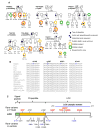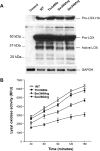LOX Mutations Predispose to Thoracic Aortic Aneurysms and Dissections
- PMID: 26838787
- PMCID: PMC4839295
- DOI: 10.1161/CIRCRESAHA.115.307130
LOX Mutations Predispose to Thoracic Aortic Aneurysms and Dissections
Abstract
Rationale: Mutations in several genes have been identified that are responsible for 25% of families with familial thoracic aortic aneurysms and dissections. However, the causative gene remains unknown in 75% of families.
Objectives: To identify the causative mutation in families with autosomal dominant inheritance of thoracic aortic aneurysms and dissections.
Methods and results: Exome sequencing was used to identify the mutation responsible for a large family with thoracic aortic aneurysms and dissections. A heterozygous rare variant, c.839G>T (p.Ser280Arg), was identified in LOX, encoding a lysyl oxidase, that segregated with disease in the family. Sanger and exome sequencing was used to investigate mutations in LOX in an additional 410 probands from unrelated families. Additional LOX rare variants that segregated with disease in families were identified, including c.125G>A (p.Trp42*), c.604G>T (p.Gly202*), c.743C>T (p.Thr248Ile), c.800A>C (p.Gln267Pro), and c.1044T>A (p.Ser348Arg). The altered amino acids cause haploinsufficiency for LOX or are located at a highly conserved LOX catalytic domain, which is relatively invariant in the population. Expression of the LOX variants p.Ser280Arg and p.Ser348Arg resulted in significantly lower lysyl oxidase activity when compared with the wild-type protein. Individuals with LOX variants had fusiform enlargement of the root and ascending thoracic aorta, leading to ascending aortic dissections.
Conclusions: These data, along with previous studies showing that the deficiency of LOX in mice or inhibition of lysyl oxidases in turkeys and rats causes aortic dissections, support the conclusion that rare genetic variants in LOX predispose to thoracic aortic disease.
Keywords: aortic aneurysm; aortic diseases; exome; mutation.
© 2016 American Heart Association, Inc.
Figures



References
-
- Biddinger A, Rocklin M, Coselli J, Milewicz DM. Familial thoracic aortic dilatations and dissections: a case control study. J Vasc Surg. 1997;25:506–511. - PubMed
-
- Albornoz G, Coady MA, Roberts M, Davies RR, Tranquilli M, Rizzo JA, Elefteriades JA. Familial thoracic aortic aneurysms and dissections–incidence, modes of inheritance, and phenotypic patterns. Ann Thorac Surg. 2006;82:1400–1405. - PubMed
-
- Pannu H, Fadulu V, Chang J, Lafont A, Hasham SN, Sparks E, Giampietro PF, Zaleski C, Estrera AL, Safi HJ, Shete S, Willing MC, Raman CS, Milewicz DM. Mutations in transforming growth factor-beta receptor type II cause familial thoracic aortic aneurysms and dissections. Circulation. 2005;112:513–520. - PubMed
-
- Zhu L, Vranckx R, Khau Van KP, Lalande A, Boisset N, Mathieu F, Wegman M, Glancy L, Gasc JM, Brunotte F, Bruneval P, Wolf JE, Michel JB, Jeunemaitre X. Mutations in myosin heavy chain 11 cause a syndrome associating thoracic aortic aneurysm/aortic dissection and patent ductus arteriosus. Nat Genet. 2006;38:343–349. - PubMed
Publication types
MeSH terms
Substances
Grants and funding
LinkOut - more resources
Full Text Sources
Other Literature Sources
Molecular Biology Databases

